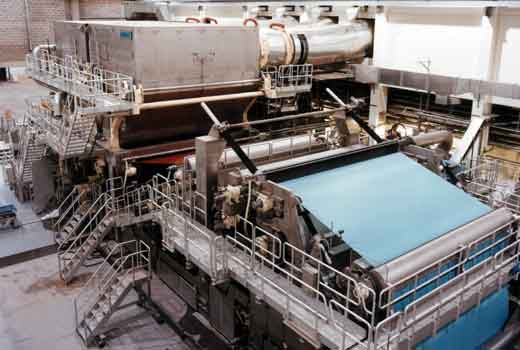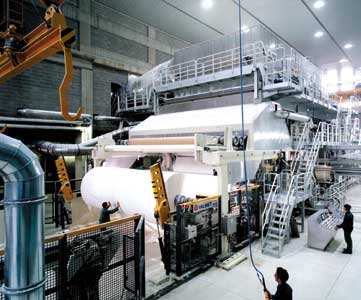Italian tissue makers move abroad
by Hugh O'Brian,
Executive Editor
Saving costs and improving customer service are two of the main attractions for Italian tissue producers who decide to invest abroad
Italy, which is Europe's largest tissue producing country, is also the world's largest exporter of tissue products with around 600,000 tonnes flowing out across its borders in 2001. This is nearly three times the tonnage, which was exported just 10 years ago in 1991. Based on cost advantages, combined with a willingness to make a wide variety of products for the private label (or retailer brands) market, the Italians tissue makers have become major suppliers of both finished product and jumbo rolls throughout Europe. They are now big players in numerous markets, including Germany, Switzerland, Austria, France, Benelux, Spain and even the UK.

Italian tissue makers are moving across Europe |
This export business has been one of the driving forces behind the massive buildup in domestic production capacity that the Italian tissue companies undertook during the 1990s. However, as the export volumes grew, these producers started looking more closely at the economies of scale and transport cost savings that could be realized by producing tissue nearer to the end customers. In addition, the recent emphasis on just-in-time deliveries, supply chain management, customer service and working capital requirements have also made it necessary for the Italians to consider placing production facilities closer to their export customers. Therefore in the late 1990s, the Italian tissue expansions changed from a domestic emphasis to projects for numerous new mills and converting lines in countries such as Spain, France, Poland, the UK and Germany.
CartoInvest
Actually, the movement first got started in the early 1990s. Among the earliest to realize the logic of local production was the CartoInvest Group, which has also been the most active in building capacity outside Italy. Based in Pistoia, in Tuscany, CartoInvest is controlled by the Carrara family. Today, the group is Italy's biggest tissue producer. It ranks seventh largest in the world with a capacity of around 450,000 tonnes/yr. CartoInvest has been in the news lately as rumors have linked it with the Swedish tissue giant SCA, which is reported to be close to buying the CartoInvest tissue operations. SCA has been searching for an acquisition candidate in Italy since the late 1980s, without success so far, so it remains to be seen how the SCA-CartoInvest talks will pan out.
Starting in 1990, CartoInvest made its first move abroad with the purchase of a minority share of Eurotisu, a tissue converter located near Barcelona, Spain. Satisfied with this experience, CartoInvest has made further major investments in its Spanish operations over the years. In 1991, a new company called Papelera San Marco was started as a joint venture between CartoInvest and Eurotisu to build a new tissue mill in Mediona, located about 50 km west of Barcelona. PM 1, which started up at the mill in 1993, is a 2.8 m wide Over Meccanica unit making around 20,000 tonnes/yr.
In 1997, CartoInvest became 100% owner of Eurotisu, using that company name for both its papermaking and converting operations in Spain. The company grew further in 1999 when a second tissue machine, a 2.8-m wide crescent former from Recard, was added, doubling the mill's capacity to 40,000 tonnes/yr. Converting capacity was also increased at the same time.
With the move into Spain successful, CartoInvest decided to enter the French market with the installation of a converting plant just north of Paris in Rantigny. As a result, instead of shipping finished product to France, it could send jumbo rolls for conversion at the Rantigny plant. This led to large savings in transport costs. The Rantigny plant remains just a converting operation with no papermaking.
In early 1999, CartoInvest announced that it was planning to start tissue paper production in the UK, following the acquisition of the Oakenholt mill in North Wales from Barlow Paper. As part of a $30 million investment plan, the company launched North Wales Tissue, which over the past two years has added two new Over Meccanica tissue machines, giving the mill a capacity of 65,000 tonnes/yr.
Delicarta
France has been the site of numerous Italian tissue investments. Delicarta, part of the Lucca-based Sofidel group, was one of the first Italian companies to install operations there when it founded its Delipapier subsidiary at a site in Frouard, near Nancy, in 1995. At that time it bought a site on the location of an old steel mill and launched a two-part plan to first build converting facilities and then a paper machine.
The initial converting lines started operating in August 1998 and now make a full range including toilet paper, kitchen towels, napkins, hankies, and facial grades. The lines were initially running on jumbo rolls imported from Delicarta's mill in Italy, as well as from outside suppliers. To reduce this dependence, Delipapier's first paper machine, a 60,000 tonne/yr Metso unit, started operation in December 1999.
KartoGroup
The Kartogroup, which includes Linder & Perla, Kartocell and Linpaper, has worked with the Spanish market since 1991. In 1999 it decided to move into France with the purchases of a tissue mill and converting plant near Lille that had previously been owned by the Finnish producer Ahlstrom. The Dalle Hygiene plants, located at Bousbecque and Wervicq-Sud, included one paper machine and 12 converting lines at the time, although a second machine was added in 2001.
Kartogroup is also known to be considering other plans for the German market, with a possible greenfield project in East Germany near Leipzig being studied. However, a final decision on the Leipzig project has not yet been taken. If it goes ahead it would be the first Italian transplant in Germany.
Cartiera Lucchese
Cartiera Lucchese has also invested abroad, with France the site of its first foreign plant, known as Lucart of France. In 1998, it bought a site near Troyes in the Champagne district, where it started the first of four converting lines in 1999. To feed the converting lines, jumbo rolls were originally shipped from Italy. However in early 2000, the company ordered a 30,000 tonne/yr Metso machine, which was put into operation at the mill in late 2001. The machine is a 2.85 m wide crescent former with a design speed of 2,100 m/min.
As with the other tissue companies, Lucchese wanted to get closer to its customers and save on shipping costs by building the plant in France. The company had a long history of selling into the French tablecloth market based on lightweight machine glazed (MG) wrapping paper and also had many private label tissue customers in France.

ICT recently started up a mill in Poland |
Industrie Cartarie Tronchetti
Industrie Cartarie Tronchetti (ICT), also based in the Lucca area, decided to go to eastern Europe for its first investment outside Italy. In late 1999, ICT bought a greenfield site in the Kostrzyn-Slubice region of Poland to build a new 26,000 tonne/yr tissue mill. The company revised that to 50,000 tonnes/yr in the wake of growing demand. ICT Poland started up the Andritz tissue unit in September 2001.
The idea is to take advantage of the giant German tissue market as well as anticipated growth in the Polish market. Initially most of the mill's tonnage is expected to go Germany. More details on this project will follow in a future issue of PPI magazine with a special report on ICT Poland.
With the first wave of Italian transplants finished it remains to be seen if these projects will be as successful as originally hoped. If so, it would be logical to expect that more such mills will pop up throughout Europe. However, given the current overcapacity situation in the European tissue market, the second wave may still be a long way off.
|